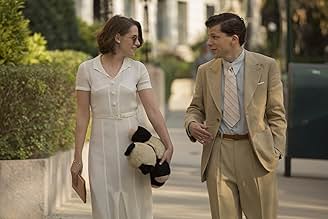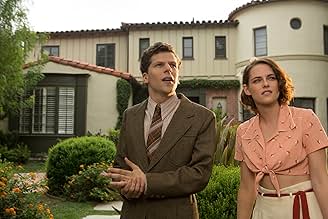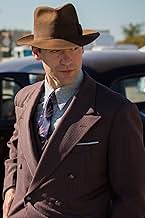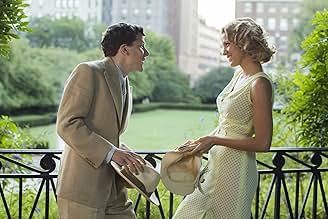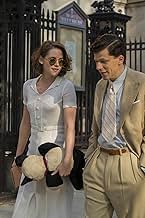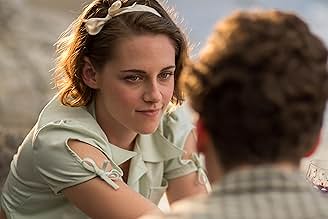AVALIAÇÃO DA IMDb
6,6/10
82 mil
SUA AVALIAÇÃO
Na década de 1930, um nativo do Bronx se muda para Hollywood e se apaixona por uma jovem que está saindo com um homem casado.Na década de 1930, um nativo do Bronx se muda para Hollywood e se apaixona por uma jovem que está saindo com um homem casado.Na década de 1930, um nativo do Bronx se muda para Hollywood e se apaixona por uma jovem que está saindo com um homem casado.
- Prêmios
- 8 indicações no total
Enredo
Você sabia?
- CuriosidadesThis is the first film since Crepúsculo (2008) that Kristen Stewart had to audition for to win the role.
- Erros de gravaçãoWhen Bobby comes to Phil's house and Phil tells him he is getting a divorce, there is a brief glimpse of the modern-day LA skyline in the upper right hand corner of the screen behind Phil.
- Trilhas sonorasI Didn't Know What Time It Was
Composed by Richard Rodgers & Lorenz Hart
Performed by Benny Goodman and His Orchestra
Courtesy of RCA Records
By arrangement with Sony Music Licensing
Avaliação em destaque
Director/writer Woody Allen's latest film can be seen as one of his most personal films to date. Dialed to the bright, nostalgic feel of Radio Days (1987), Cafe Society nevertheless reels from an undercurrent of existential authenticity a la Husbands and Wives (1992) poetically and often ruefully addressing the feeling of having lost the road not taken.
Our protagonist is young up-and-comer Bobby Dorfman (Eisenberg), a New Yorker, whose dreams of making it in Hollywood rests uneasily over some very scrawny shoulders. At first he's aided by his Uncle Phil (Carell), an agent and powerhouse among the coastal elite. He sets him up as an assistant and script-reader. Bobby's family dutifully keeps tabs on him back in New York as he climbs the slippery ladder of Hollywood's well-to-do, finding friends in Steve (Schneider) and Rad Taylor (Posey) who have a hand in controlling the talent pipeline from coast to coast. His closest friend and eventual paramour however is Vonnie (Stewart) a comparatively down to earth secretary who would rather bask in the glow of the warm sun then in glitzy opulence. He idolizes her, pines for her despite her insistence that she has a boyfriend; an older man as we later find out.
Woody Allen himself provides the narration for this gentle nostalgia tour through Golden Age Hollywood. Much like his voice, the film feels warm, familiar if sadly slow and blunted. Lacking the consistently snappy tone of earlier works, Cafe Society leans a little too heavily on the love triangle, which granted, captures some excellent drama but is singed from overcooking. When we are rewarded with the usual delights of Allen's repertoire, it all comes out banal, like a list of axioms repeated one too many times.
Yet despite lacking the verbal excitement of Allen's prized filmography, Cafe Society more than delivers in gorgeous cinematography, characterization and themes which are glamorously brought to life by a talented cast. Steve Carell's natural amiability allows us to more easily welter in Phil's more unsavory character decisions which includes having his nephew wait in the waiting room of his office for weeks. He's an agent but he lacks the boorishness of Ari Gold. He believes in what he's selling, and given the way he name- drops by the poolside and the fondness industry insiders seem to have for him, you can tell he's good at what he does. Jesse Eisenberg brings the same frazzled nudnik buoyancy he previously brought to Allen's To Rome with Love (2012). It's easy to see why Eisenberg is a repeated player, the man brings all the trappings of Woody's old characters only with a slightly stronger edge.
If there's one standout however it would have to be Kristen Stewart who resists being the flavorless object of affection. Goodness knows it could have been easy given the time period of the film (not to mention her previous role in the Twilight Series (2008-2012)), but her strident autonomy keeps us invested. She's a piece of Citrine amid fool's gold, a girl next door above the ostentatiousness of industry fugazi. A girl to bring home to mamma.
Much of Bobby's character develops between the intoxicating glamour of Hollywood and the provocative corruptibility of New York City. The dichotomy has a night and day quality that is mirrored by the earthy Vonnie and the glittering Veronica (Lively) who appears later in the film. Large swaths of the movie take place in the Big Apple, much of which concentrates on the foibles of Bobby's sister (Lennick), brother-in-law (Kunken) and mobster brother (Stoll). Far from being unnecessary asides, these stories aptly meld into the film's large themes: love, respect and regret.
With the denseness of a novel and the light touch of Allen's finest, a question the emerges; what is the director trying to tell us through this story? Bobby's balance between the two cities he calls home, mimics Woody Allen's long, illustrious trajectory as a member of the New York intelligentsia and a Hollywood staple. Perhaps he's trying to tell us our problems may seem significant to us and every choice we make means another choice has been deferred, yet in the grand scheme of things, life is ultimately a comedy.
Our protagonist is young up-and-comer Bobby Dorfman (Eisenberg), a New Yorker, whose dreams of making it in Hollywood rests uneasily over some very scrawny shoulders. At first he's aided by his Uncle Phil (Carell), an agent and powerhouse among the coastal elite. He sets him up as an assistant and script-reader. Bobby's family dutifully keeps tabs on him back in New York as he climbs the slippery ladder of Hollywood's well-to-do, finding friends in Steve (Schneider) and Rad Taylor (Posey) who have a hand in controlling the talent pipeline from coast to coast. His closest friend and eventual paramour however is Vonnie (Stewart) a comparatively down to earth secretary who would rather bask in the glow of the warm sun then in glitzy opulence. He idolizes her, pines for her despite her insistence that she has a boyfriend; an older man as we later find out.
Woody Allen himself provides the narration for this gentle nostalgia tour through Golden Age Hollywood. Much like his voice, the film feels warm, familiar if sadly slow and blunted. Lacking the consistently snappy tone of earlier works, Cafe Society leans a little too heavily on the love triangle, which granted, captures some excellent drama but is singed from overcooking. When we are rewarded with the usual delights of Allen's repertoire, it all comes out banal, like a list of axioms repeated one too many times.
Yet despite lacking the verbal excitement of Allen's prized filmography, Cafe Society more than delivers in gorgeous cinematography, characterization and themes which are glamorously brought to life by a talented cast. Steve Carell's natural amiability allows us to more easily welter in Phil's more unsavory character decisions which includes having his nephew wait in the waiting room of his office for weeks. He's an agent but he lacks the boorishness of Ari Gold. He believes in what he's selling, and given the way he name- drops by the poolside and the fondness industry insiders seem to have for him, you can tell he's good at what he does. Jesse Eisenberg brings the same frazzled nudnik buoyancy he previously brought to Allen's To Rome with Love (2012). It's easy to see why Eisenberg is a repeated player, the man brings all the trappings of Woody's old characters only with a slightly stronger edge.
If there's one standout however it would have to be Kristen Stewart who resists being the flavorless object of affection. Goodness knows it could have been easy given the time period of the film (not to mention her previous role in the Twilight Series (2008-2012)), but her strident autonomy keeps us invested. She's a piece of Citrine amid fool's gold, a girl next door above the ostentatiousness of industry fugazi. A girl to bring home to mamma.
Much of Bobby's character develops between the intoxicating glamour of Hollywood and the provocative corruptibility of New York City. The dichotomy has a night and day quality that is mirrored by the earthy Vonnie and the glittering Veronica (Lively) who appears later in the film. Large swaths of the movie take place in the Big Apple, much of which concentrates on the foibles of Bobby's sister (Lennick), brother-in-law (Kunken) and mobster brother (Stoll). Far from being unnecessary asides, these stories aptly meld into the film's large themes: love, respect and regret.
With the denseness of a novel and the light touch of Allen's finest, a question the emerges; what is the director trying to tell us through this story? Bobby's balance between the two cities he calls home, mimics Woody Allen's long, illustrious trajectory as a member of the New York intelligentsia and a Hollywood staple. Perhaps he's trying to tell us our problems may seem significant to us and every choice we make means another choice has been deferred, yet in the grand scheme of things, life is ultimately a comedy.
- bkrauser-81-311064
- 9 de ago. de 2016
- Link permanente
Principais escolhas
Faça login para avaliar e ver a lista de recomendações personalizadas
- How long is Café Society?Fornecido pela Alexa
Detalhes
Bilheteria
- Orçamento
- US$ 30.000.000 (estimativa)
- Faturamento bruto nos EUA e Canadá
- US$ 11.103.205
- Fim de semana de estreia nos EUA e Canadá
- US$ 359.289
- 17 de jul. de 2016
- Faturamento bruto mundial
- US$ 43.763.247
- Tempo de duração1 hora 36 minutos
- Cor
- Mixagem de som
- Proporção
- 2.00 : 1
Contribua para esta página
Sugerir uma alteração ou adicionar conteúdo ausente








